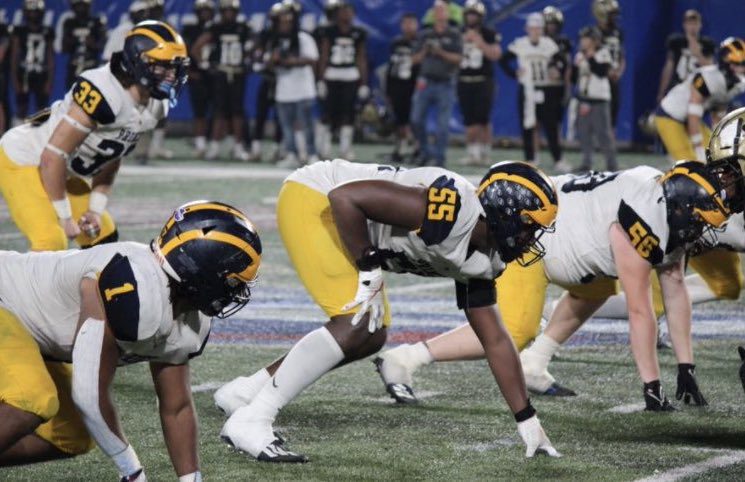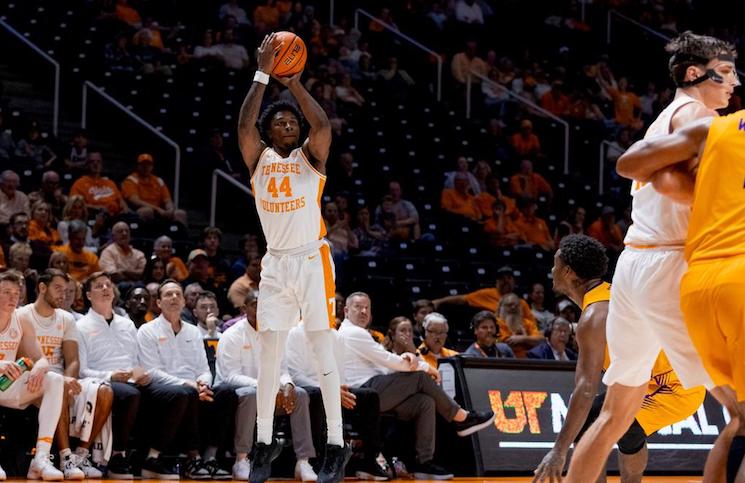As of publication of this article on early Sunday afternoon, there’s no confirmation that Tennessee has hired Mike DeBord as its offensive coordinator. But rumors and reports are circulating to the point where it’s time to take a closer look at the former Central Michigan head coach and Michigan offensive coordinator, who Butch Jones worked under as an assistant coach and then an offensive coordinator at CMU from 2000-03.
It should also be noted that even if DeBord is brought to Knoxville, there’s no guarantee at this point that it would be as a full-fledged offensive coordinator. Co-coordinators, run/pass game coordinators and other configurations are becoming increasingly popular, so nothing can be ruled out, including the idea that DeBord could actually be a position coach and then somebody on staff, presumably Zach Azzanni, could be promoted to OC.
But with that in mind, here’s more information on the man who could be UT’s next offensive coordinator (and check out our look at some other candidates should the search continue on):
The Jones/DeBord connection
Though they may have crossed paths earlier on, the formal beginning of Jones’ relationship with DeBord came in 2000, when Jones, then a running backs coach under former CMU coach Dick Flynn was retained by DeBord, who came over from his post as the offensive coordinator at Michigan to be the new head coach at CMU.
By all accounts, Jones and DeBord clicked. Not only did he keep him on staff, he actually promoted him to offensive coordinator in 2002, a position Jones would remain in until the end of DeBord’s tenure at CMU following the 2003 season. So while the popular perception of Jones is that he was raised up as a spread-minded coach, much of his early influence came from the more pro-style-oriented DeBord. So much so that DeBord was one of the few coaches Jones mentioned as an influence when he was hired at UT in late 2012.
“Obviously, there are a number of individuals who have really kind of helped define some of my principles,” Jones said in 2012. “I’ve been very fortunate to work for a lot of very successful coaches – not just head coaches – but many assistant coaches who are now in the National Football League. I take a little bit from Rich Rodriguez. I take a little bit from Brian Kelly. I take a little bit from Mike DeBord, who was the head coach at Central Michigan and is now the Tight Ends coach with the Chicago Bears.”
More on DeBord’s coaching history
A four-year offensive line starter at Manchester College, DeBord then moved on to the coaching ranks, where he worked his way up through seven stops – primarily coaching offensive line – before reaching Michigan in 1992. He remained an O-line coach with the Wolverines until 1997, when he took over as offensive coordinator under Lloyd Carr that season.
This coming period serves as the golden era of DeBord’s career. Michigan went undefeated in 1997 – claiming an AP national title with DeBord calling the offense. It was certainly a team effort. The Wolverines were strong on defense, had (stop reading now if you can’t stomach it) Charles Woodson making plays in all three phases, a strong rushing attack led by Chris Howard and Anthony Thomas and an efficient quarterback in future pro Brian Griese who was protected by a strong offensive line.
And while it’s fair to say that this Michigan offense was conservative, it would be inaccurate to say that DeBord never strayed from the I-formation. Here the Wolverines go four-wide against Ohio State (screenshots via ESPN Classic):
But using a fullback, a tight end (or tight ends) was more the norm under DeBord. This was a more typical look:
The next two seasons – 1998 and 1999 – fell short of national title aspirations, but Michigan was a combined 20-5 with two top-12 finishes in the AP Poll in those two seasons. Michigan relied more on the passing game over the next two seasons with Tom Brady primarily at the helm.
DeBord’s early Michigan offenses could always be categorized as balanced on some levels, but the pendulum swung from a more run-heavy attack to more emphasis on the passing game. After averaging 184.4 yards passing in DeBord’s first season, the Wolverines were up to 234 yards per game through the air in 1999, while the rushing average dropped from 171.7 to 118.8 yards per game in that time span.
DeBord took the leap to head coach the following year, going to his aforementioned job at Central Michigan, where he would team up with Jones. It wouldn’t be fair to say that his career went to a downward spiral at this point, but he clearly never attained the level of consistent success that he did in the late 90s at Michigan.
The Chippewas would go 12-34 in four years under DeBord, leading to his resignation in 2003, where he simply stated, “It was the most difficult decision I’ve ever made. I felt to finish the rebuilding process that we needed more resources and guaranteed time.”
While it’s hard to say that a ton went right with such a poor overall record, it really was the defense that struggled the most during DeBord’s tenure at CMU. His final season in 2003 saw CMU give up over 500 yards of total offense per game. But while the defense was his undoing in many respects, DeBord did develop a strong rushing attack, hovering around the 200-yard per game average his final two seasons there.
This was part of the outlook given for DeBord’s final team before the 2003 season in a preview:
“In the Mike DeBord era, the running game has always been the staple of this offense. Despite the one-back look often used, they are most effective when lining up in the “I” and running it right at a defense.”
In a Q&A with CMU’s official website, DeBord said this about his offense heading into 2003: “Our offense will be built to control the ball. We cannot have turnovers or penalties.”
His resignation at CMU led him back to Michigan, where he became the recruiting and special teams coordinator for the Wolverines in 2004. In 2006, a coaching shakeup left the OC position vacant at Michigan, and Carr, after a disappointing 7-5 season, again turned to DeBord to replace Terry Malone. DeBord helped stabilize the offense, installing a zone-blocking scheme that was more friendly to Michigan’s personnel (and is something UT uses a lot under Jones currently), helping the Wolverines get back in the top-10 with an 11-2 overall season that ended with a loss in the Rose Bowl.
The next season, 2007, would mark the end of Carr and DeBord’s tenure at Michigan. Though some success had been mixed in since that late 90s run, the Wolverines hadn’t won a postseason contest since 2002 at this point and were slipping from their status as one of the elite programs.
Back-to-back losses to start the season, including the infamous upset by FCS-level Appalachian State in the season opener, set the wheels in motion for Carr to retire after the season. The team recovered to win nine games – including a Citrus Bowl win over Florida, but that wasn’t enough to completely salvage the season. DeBord is widely remembered as the coordinator who helped win a lot of games at Michigan, but also as an extension of the conservative approach from Carr that Michigan wanted to move away from at that time. Some also criticized him for failing to maximize a loaded 2007 roster that included Chad Henne, Mike Hart, Jake Long, Mario Manningham and other future pros.
The Wolverines, however, did actually consider DeBord as Carr’s replacement, but ultimately went with, ironically, Rich Rodriguez of West Virginia – the coach that Jones went on to be an assistant under after his time under DeBord at CMU. DeBord, who was rumored to be a candidate for Tennessee’s open OC spot heading into what was Phillip Fulmer’s last season in 2008, moved on to the NFL where he got back to his roots as a coach – working with the offensive line and tight ends at stops in Seattle (2008-09) and Chicago (2010-12).
DeBord worked under multiple head coaches during that time, including Mike Holmgren, Jim Mora Jr. and Lovie Smith. After Smith was fired in Chicago, DeBord left coaching, taking an administrative position at Michigan, overseeing the Olympic sports there. He briefly took over day-to-day operations of the football program after Brady Hoke was fired and before the Wolverines recently hired Jim Harbaugh.
What would the fit look like at Tennessee?
About 1,300 words later, we get to the question that means the most and that most of you are probably asking. It would be – especially if he’s named the full offensive coordinator with play-calling duties – an interesting hire for sure. In one sense he fits the profile of what to expect from a Jones hire perfectly. Jones has gone with familiarity in almost all of his hires at Tennessee – choosing to bring a majority of his staff from Cincinnati with him when he was first hired in Knoxville. Bringing in DeBord, a man he is thoroughly familiar with to the point that he lists him as an influence, makes a lot of sense.
You can check off the boxes of play-calling experience, NFL ties and head-coaching experience with DeBord. Though Jones has a heavy influence on the offense, he’s also characterized himself as more of a CEO than a micro-manager. He wants his coordinators to take care of their respective sides of the ball. Jones would certainly feel comfortable with DeBord doing just that on offense. DeBord specializes in the offensive line, the run game and physical football – all things that Tennessee wants to improve upon.
And DeBord’s switch to the zone-blocking philosophy in 2006 and some adjustments later in his career at Michigan makes the thought of him jumping in to lead UT’s offense a little bit more understandable. Perhaps Jones sees this as an opportunity to further intertwine the spread principles that are in place with him and his current staff with some downhill, pro-style running elements that could make UT’s offense with the likes of Jalen Hurd, Alvin Kamara and Joshua Dobbs running the ball, very tough to stop.
Remember that Ohio State, coached by Urban Meyer – somebody else Jones mentioned as a friend and influence in his introductory press conference, just won a title with a spread offense that ran the ball with somewhat of an old-school mentality.
But while Jones is hesitant to label Tennessee’s offense as a pure “spread,” the reality remains that it is, in many regards. And while, as noted earlier, it wouldn’t be accurate to say that DeBord has only utilized an I-formation, it is true to say that the vast majority of his offensive history has been based around a system that looks different than what has been seen in Knoxville for the past two years. He’s also been out of the game for two seasons, out of college football since 2007 and hasn’t called plays in that timespan either. Questions will also be raised about his ability to recruit due to his time out of the game and his lack of connections and experience working the recruiting trails of the South.
That doesn’t mean that this potential hire can’t or won’t work. Hires, after all, can only be judged completely with hindsight.
It does, however, make an interesting, and perhaps even odd, fit schematically speaking to turn this offense over to DeBord unless Jones wants to make some fundamental changes to the way the offense is operated – which seems highly unlikely. It’s a fairly safe assumption to say that Jones won’t, nor does he really need, to change the basis of what the Vols do on offense. Though the offensive numbers weren’t impressive overall for the 2014 season due to midseason struggles, a 4-1 finish with a huge bowl win and a resurgence on offense with Dobbs, who will remain at UT for probably two more years, makes it more logical to build on what worked rather than to remake the offense into something else.
And there’s also the question of what the staff would look like if the rest remains in tact and DeBord joins it. There’s no true quarterbacks coach to be found. DeBord hasn’t been a QBs coach since the 1980s, and has just one year of experience at a lower level in that area. No other member of UT’s current offensive staff has any experience as a QBs coach.
All of this circles back to what was said at the beginning, though, that it’s unclear what exactly bringing DeBord to Knoxville would do to the staff – that could all depend on what title he’s given if hired and if there’s anymore staff movement (remember, Zach Azzanni has been linked to the CMU head coach opening).
While blind, unquestioning support of a head coach and his moves isn’t healthy for a fan base, Jones has clearly done enough right in Knoxville to gain the benefit of the doubt when making this hire. Some of the coaches he brought originally were questioned at large by fans and media alike, only to become essential parts of helping rebuild a program that is on a significantly better trajectory than it was just a couple years ago.
It’ll be interesting to see how this unfolds if, indeed, it is the direction that Jones goes.






